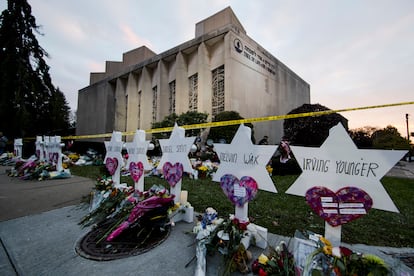The man who murdered 11 people at a Pittsburgh synagogue in 2018 is sentenced to death
A white supremacist, the killer had posted messages on social media about preserving the white race before the attack


Robert Bowers, the truck driver responsible for the mass shooting at a Pittsburgh synagogue that killed 11 worshipers and injured six others, has been sentenced to death by the jury that convicted him in June on numerous charges, including hate crimes resulting in death. The attack, which was the deadliest against the Jewish community in U.S. history, took place during a Shabbat celebration in October 2018. Since the decision is binding, the judge will formally hand down the sentence at a hearing on Thursday morning, when some of the victims’ families are scheduled to address the court.
Prior to storming the Tree of Life synagogue armed with an AR-15 rifle and three handguns, Bowers, 50, had posted messages on social media about the need to preserve the white race. In June, he was convicted of 63 federal charges, including hate crimes resulting in death and obstruction of the free exercise of religion. The members of three congregations were in the synagogue at the time of the attack. The victims, eight men and three women, ranged in age from 54 to 97.
Jurors accepted many of the defense’s mitigating factors, such as the fact that Bowers had a troubled childhood and had attempted suicide as a teenager. But they rejected key considerations, such as the claim that Bowers was schizophrenic and had perpetrated the murderous attack “in a fit of mental or emotional disturbance.” Bowers joins a long list of convicts on death row in the United States.
During the trial, Bowers did not deny his guilt, but his lawyers argued that his long history of psychiatric problems and chaotic childhood should exempt him from the death penalty. Jurors deliberated for 10 hours over the previous two days. Expert witnesses who testified at the trial argued that the killer’s racist and anti-Semitic views were not the product of his own delusions, because they were shared by thousands of people on far-right social media sites. For their part, prosecutors argued for the death penalty by detailing the intentionality of the attack, which Bowers had planned for some time. They also highlighted Bowers’s statements from years later, after he was already in prison, in which he declared that the only thing he regretted was not killing more Jews.
Commenting on the attack but not the sentence, the Anti-Defamation League (ADL) posted on X, the social media site formerly known as Twitter: “Today, a jury sentenced the perpetrator of the worst attack against American Jews in our history to the death penalty. We know this is a hard day for many, especially in Pittsburgh. We must keep working to protect Jewish communities from the horrors of #antisemitism.”
But Abraham Bonowitz, the executive director of Death Penalty Action, a group that opposes capital punishment, warned of the risk of turning Bowers into a role model or even a martyr for other white supremacists. In a statement posted on the group’s Twitter account, he said: “Instead of fading to obscurity, this racist, anti-Semitic terrorist gains notoriety as a martyr for others who think like [he] does.” Bonowitz also noted that the appeals process is likely to take years, “reopening wounds repeatedly for at least a decade or two.”
Sign up for our weekly newsletter to get more English-language news coverage from EL PAÍS USA Edition
Tu suscripción se está usando en otro dispositivo
¿Quieres añadir otro usuario a tu suscripción?
Si continúas leyendo en este dispositivo, no se podrá leer en el otro.
FlechaTu suscripción se está usando en otro dispositivo y solo puedes acceder a EL PAÍS desde un dispositivo a la vez.
Si quieres compartir tu cuenta, cambia tu suscripción a la modalidad Premium, así podrás añadir otro usuario. Cada uno accederá con su propia cuenta de email, lo que os permitirá personalizar vuestra experiencia en EL PAÍS.
¿Tienes una suscripción de empresa? Accede aquí para contratar más cuentas.
En el caso de no saber quién está usando tu cuenta, te recomendamos cambiar tu contraseña aquí.
Si decides continuar compartiendo tu cuenta, este mensaje se mostrará en tu dispositivo y en el de la otra persona que está usando tu cuenta de forma indefinida, afectando a tu experiencia de lectura. Puedes consultar aquí los términos y condiciones de la suscripción digital.








































